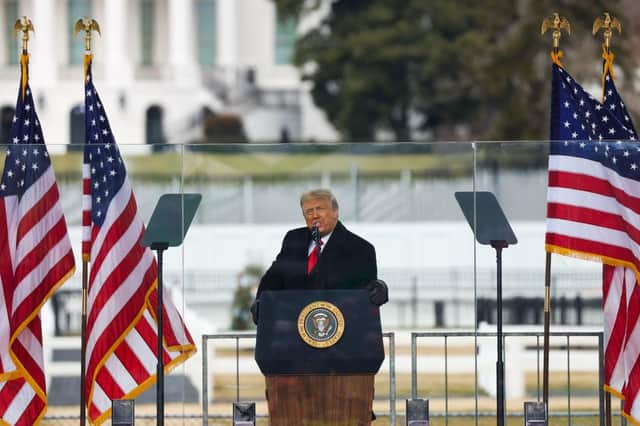What does impeachment mean? Process explained and whether Donald Trump could be removed from office over Capitol riots


The House of Representatives has impeached Donald Trump for a second time charging him with “incitement of insurrection”.
Lawmakers argued that the president’s heated rhetoric and praise of rioters led to a deadly insurrection at the US Capitol.
Advertisement
Hide AdAdvertisement
Hide AdJust three presidents have been impeached in US history – and on Wednesday Trump became the first in history to be impeached twice.
Now Donald Trump faces a wait to see if he is convicted of impeachment by the Republican-controlled Senate.
What is impeachment?
Impeachment is a charge of misconduct brought against someone holding public office.
These charges are brought forward by members of congress and can be used to charge the United States president.
The American Constitution states that a president can be impeached and removed from office for a number of reasons, including "treason, bribery, or other high crimes and misdemeanors."
The impeachment process explained
Impeachment procedings must pass through the lower and upper houses of congress.
First, a majority of members of the House of Representatives must approve articles of impeachment. The House of Representatives would likely vote through impeachment, as it is made up of a majority of Democrats.
Second, two-thirds of the Senate would be required to vote in favour of impeachment in order to convict the president and have him removed from office.
Could Trump be removed from office?
Advertisement
Hide AdAdvertisement
Hide AdThe House of Representatives voted for impeachment, making Donald Trump the first president in US history to be impeached on two occasions.
From here the impeachment process passes to the Senate for a trial supervised by the Supreme Court of Justice.
Senators will then vote on whether or not to convict the president of impeachment.
Senate house leader Mitch McConnell has indicated that a trial of Trump would not take place until Joe Biden’s inauguration, meaning Trump would not be removed from office.
What happened the first time Trump was impeached?
In 2020, the 45th president was impeached for the first time, accused of withholding aid from Ukraine while requesting the country's president dig up dirt on Joe Biden, the now president-elect. He was charged with abuse of power and charge of obstruction of Congress.
The vote to impeach easily passed the House of Representatives, making the president just he third president in history to be impeached. The republican-controlled Senate however voted against impeaching the president, with just one senator, Mitt Romney, opting to convict the president.
Why are Democrats calling for Trump’s impeachment again?
President Trump has been accused of sparking an insurrectionist attack on the US Capitol.
The president had urged his supporters to protest as Congress was counting the electoral votes that confirmed Biden's win.
Five people died, including a Capitol Police officer.
Have Presidents been impeached before?
Advertisement
Hide AdAdvertisement
Hide AdThree, including Donald Trump, have been impeached by the House and none have been removed from the White House by the Senate.
Impeachment did not appear to damage Bill Clinton's popularity with the American public, and Democrats did better than expected during the midterm elections that took place shortly after the process began.
Polling even suggests Clinton is the most popular living president.
Following the Watergate scandal, Richard Nixon faced impeachment for the obstruction of justice, abuse of power and contempt of congress in 1974 , but he resigned before the House could vote on impeachment.
Andrew Johnson was impeached for "high crimes and misdemeanours" in March 1868 after he removed the Secretary for War from office. The Senate did not find him guilty, however, and he served out one term.
President Johnson never ran for election as president, having taken the job after Abraham Lincoln was assassinated.
